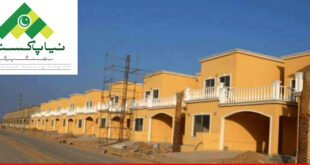The policy makers have once again realized the important of home, which is one of the basic needs of every individual in a civilized society as every one desire to have a decent place that is ones’ own house. However is painful to see that this genuine need remains a dream for millions of the people primarily due to economic disparity and unjust distribution of resources that has rendered a huge number without any shelter on their heads.
Realizing the fact that housing as a industry has a more broader role in the development of overall economy and ensuring long term sustainable economic growth, the budget 2016 has offered attractive incentives to those involved in construction industry, which include tax exemption on sale of any property, tax exemption to brick and gravel etc to encourage construction activity, which caters to over 42 allied industries.
It will be interesting to note that not only the conventional banking sector has been asked for soft term home loans on one hand while the Islamic banking, which has taken a kick start in Pakistan has also entered in the house financing arena, which is a good sign for the construction industry overall. It may be mentioned that there is backlog of over 10 million housing units while this number keeps on growing every year with population growth rate.
The business potential has attracted the Islamic Banking Industry towards house financing schemes. In this respect the Standard Chartered Bank has also taken initiative of introducing Shariah-compliant home financing under the flag ship of Saadiq, for its Retail Clients in Pakistan.
Saadiq Home Finance is a Shariah-compliant home finance solution based on the Islamic structure of ‘Diminishing Musharakah’. Clients can get up to 75 per cent financing of the property value at competitive pricing.
Saadiq Home Finance can be availed for up to 20 year financing tenor with zero processing charges. Clients have four financing options available: Purchasing a new home, renovating their home, transferring their existing home finance facility to Saadiq Home Finance and getting enhancement on their existing Saadiq Home Finance for renovations.
Additionally, clients can also benefit from pre-approved Shariah-compliant Saadiq Credit Card to help them furnish their home in easy instalments at zero extra charges from the Bank’s partner merchants.
To introduce the Saadiq Home Finance to the Saadiq suite, Ali Allawala, Head of Islamic Banking, Retail Clients, said “Developing Islamic Banking products based on client needs is a key focus area of the Bank. Our comprehensive range of Islamic banking products and services are innovative and unique in the country. By further catering to the Islamic banking market looking for Shariah-compliant home finance, Standard Chartered Pakistan is able to strengthen its position as the bank of choice for clients”.
The Saadiq division comprises a team of qualified professionals who design and structure Islamic financial solutions and ensure that they are in line with Shariah principles. All Saadiq products are approved by an independent Shariah Supervisory Committee composed of respected and qualified scholars of international repute. Its operations are reviewed and appraised by a dedicated Shariah Advisor who provides guidance on Shariah related matters. These products aim to provide clients with a convenient, effective and rewarding banking experience, all in line with their beliefs.
Public sector role in housing industry
The government also recognizes the potential of housing and construction in terms of overall economic growth and has placed it as priority sectors in its overall development agenda. However, the government so has not been able to capitalize on the full potential of the housing sector as a developed industry due to various irritants such as rampant corruption in the government organizations responsible for land development. The cost of land and building material has gone beyond the reach of even middle income groups while the concept of low cost housing schemes more often than not are sabotaged by the political considerations and corrupt elements depriving the genuine people of their rights of having a house at an affordable price.
According to a report the urban population in Pakistan is to grow at the rate of 30 percent between 2010 and 2020. Constantly growing population and increasing urbanization has created major shortage of housing units in metropolitan areas in Pakistan. While the World Bank estimates a backlog of around eight million housing units in 2009, and the gap between supply and demand is increasing by more than 300,000 units every year.
In this backdrop the government has taken initiatives to support construction industry and low rate housing finance which are certainly good steps on the part of the government, however, to make these initiatives as result-oriented the government would be required to keen a constant watch of the vested interest to protect this noble cause of providing shelter to the homeless facilities.
 PAGE Blog Business Weekly Magazine
PAGE Blog Business Weekly Magazine

